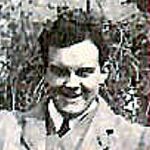Private 20740, 103rd Regiment 10th Battalion
Canadian Over-Seas Expeditionary Force
Died 22nd May 1915, aged 29
Remembered Vimy Memorial
& on both Blakeney War Memorials
Percy Henry Allen was born in Surbiton, Surrey, 15th August, 1885, the second of four sons and third of six children born to John William Allen (born Great Yarmouth 1854) and his wife Annie Laura Butcher (born Stony Stratford, Buckinghamshire). Percy’s eldest and youngest brothers, John Carlyle Allen (born 1880) and William Ruskin Allen (born 1896) also served in the war and both survived although William was a prisoner of war until Christmas Day, 1918.
Percy was neither born in Blakeney nor ever lived or worked here. His connection with Blakeney, and consequently his raison d’être for being included on the War Memorials lies with his father, John Allen, whose family came from Wells. John was an Editor for Longmans, the London publishers, but spent his holidays in Blakeney where he could sail his boats, Curlew and Flittermouse. He was a keen associate of Dr. Sydney Long, also from Wells, and the two collaborated on local conservation issues together. At first John rented a cottage on the Quay from Augustus Hill then in 1909 bought land on the Morston Road where he built his retirement home, Allendune (now Mallards Reach); this is where Percy visited and William recuperated, after being wounded, before returning to the Front.
The 1911 Census has Percy living at home with his father and brother John at 3 St. Matthews Avenue, Surbiton, Surrey together with a housekeeper and live in maid. His father and brother were Editors to a Publishing firm whilst Percy was ‘Clerk to Publishing firm’, presumably all working for Longmans of London.
Percy,
however had studied Applied Chemistry and Metallurgy at the Manchester
Municipal College of Technology and it was as a Motor Engineer that he enlisted
with the
Canadian Over-Seas Expeditionary Force on 23rd September 1914 at
Valcartier, near Quebec. He was
unmarried, aged 29, and quite tall, standing at 5ft 10½ inches.
His unit, the 10th Battalion Canadian Infantry (103rd Regiment Calgary Rifles) left for the UK, 3rd October 1914, where winter was spent training on Salisbury Plain. They embarked for France, February 1915, and were placed in reserve. Letters Percy wrote home in early May 1915 describe his experiences in Flanders during the opening days of the Second Battle of Ypres. He was exposed to the first gas attack as his battalion rapidly made their way to retake Kitchener’s Wood; a successful, but costly, manoeuvre for which they were dubbed the “ the Gallant 10th”. Later that same month, on the 20th May, his unit was back in action further south, near Festubert in France. The German attacks were again so fierce that, on 22nd May, his battalion was ordered to withdraw from the trenches they had just captured. During these few days 18 officers and 250 other ranks were lost, including Percy. It is presumed that Percy was killed outright.
Percy lies buried at the “head of Willow Road, near Festubert” in an inaccessible position, consequently his grave has never been located. He is remembered with Honour on the Vimy Memorial, The Manchester Municipal College of Technology in the Sackville Building and on both the Blakeney War Memorials.

